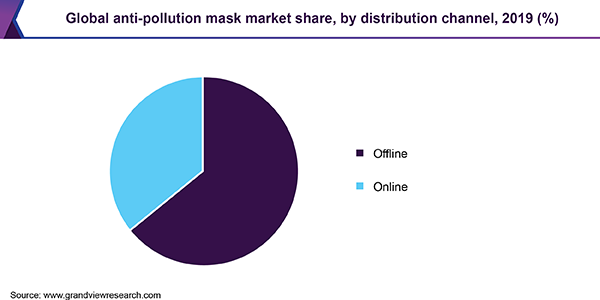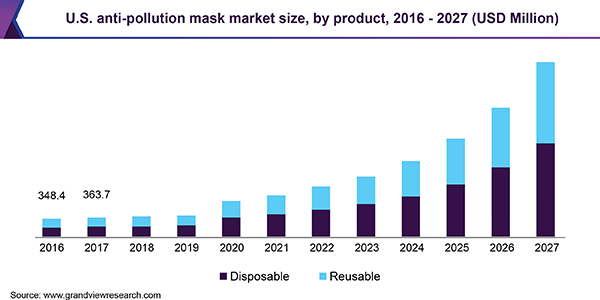The global anti-pollution mask market size is expected to reach USD 22.3 billion by 2027, expanding at a CAGR of 30.1% over the forecast period, according to a new report by Grand View Research, Inc. Factors such as rising awareness for remedial measures to combat increased pollution levels and high rate of adoption of healthy lifestyle are expected to remain the prominent trends in the market.
The recent outbreak of COVID-19 pandemic is expected to drive the demand for anti-pollution masks during the forecast period. According to a report by Cable News Network, 3M Company has been witnessing an unprecedented spike in the demand for N95 respirator masks since the beginning of 2020 across the globe. Shortage of protection masks in maximum offline stores as well as major e-commerce platforms has led to manufacturers ramping up their production capacity and distribution channels, which is one of the key attributes driving the market growth.
/image%2F6144638%2F20201210%2Fob_987440_anti-pollution-mask-market.png)
View exclusive Global strategic Business report
Similarly, in February 2020, The Caffeinery's began its coffee roasting program. The roaster roasts three pounds of coffee every nine minutes. The company also offers decaffeinated blend, which has been awarded several times for its year-round catalog. Likewise, in January 2020, McDonald’s through its brand, McCafe launched decaf coffee drinks with the aim of attracting local customers who are sensitive to caffeine and heavy coffee drinkers. Four such drinks are available, which include Americano, McCafe Latte, Cappuccino, and Espresso. This offers a variety of choices for customers seeking to control their daily caffeine intake.
Key decaffeinated coffee market participants include SWISS WATER DECAFFEINATED COFFEE INC.; LifeBoost Decaf; Cafe Don Pablo Colombia Supremo Decaf; No Fun Jo Decaf; and Fresh Roasted. Product innovation is expected to remain a key strategy among the industry players in the near future.
Further key findings from the report suggest:
- The recent outbreak of COVID-19 pandemic is expected to drive the demand for anti-pollution masks. Consumers have been gravitating toward the usage of anti-pollution masks to protect themselves from breathing in the pathogens that may be present in the air
- In terms of revenue, the reusable product segment is projected to ascend at a CAGR of 30.2% from 2020 to 2027
- Offline channel of distribution dominated the global anti-pollution mask market with an overall revenue share of over 64% in 2019
- North America is expected to remain one of the key markets, accounting for 28.7% of global revenue share in 2019
- Increasing rate of pollution level owing to rapid industrialization and urbanization in countries such as India and China, is expected to boost the growth of Asia Pacific market
- The industry is highly competitive in nature with the main players including 3M, Honeywell International Inc.; KCWW; Totobobo Pte. Ltd.; MSA; and RESPRO.

To understand key trends, Download Free Sample Report
The growing urbanization and industrialization particularly in developing regions such as India and China plays a predominant role in increasing the pollution level. In addition, increasing number of vehicles adds to further degradation of air quality. These factors play a major role in driving the demand for anti-pollution masks in the market. Anti-pollution masks are available in different standard ratings such as N95, N99, N100, P95, and P100, as recommended by NIOSH, an association of U.S. Centers for Disease Control and Prevention.
The P rated masks are resistant to oil based particles and are used for working at places exposed to oil whereas, N rated ones are not resistant to oil based pollutants. N95 filters up to 95% of the Particulate Matter 2.5 (PM2.5) while, N99 masks filter up to 99% of PM2.5 owing to the higher rate of filtration.
Asia Pacific region is expected to witness the largest as well as fastest growth owing to rapid industrialization and development in automobile sector. The rapidly growing population in developing economies such as India and China is leading to rapid urbanization, which is increasing the pollutant levels in the atmosphere, thus boosting the product demand. According to a report by Institute for Health Metrics and Evaluation, 5.5 people die every year on account of indoor and outdoor air pollution.
The prominent players in the anti-pollution mask market are focusing on product innovation. For instance, in November 2016, Xiaomi launched battery powered anti-pollution mask to filter out PM2.5 particles from breathing. It is manufactured with hand-woven polyester material and equipped with battery powered nano filter, which is chargeable through a USB port. Furthermore, in November 2018, O2TODAY launched urban face mask, O2SafeAir through global travel retail Indiegogo. It is expected to be highly breathable, machine washable and engages with interchangeable filters from protection against pollution and microorganisms.
Increasing demand for anti-pollution masks along with a shortage in the supply has led to many manufacturers ramping up their production capacity, which is among the key attributes driving the market growth. Consumers have been gravitating toward the usage of anti-pollution masks to protect themselves from breathing in pathogens that may be present in the air.
Anti-pollution masks, which filter out particles, are designed for commuters to protect them from pollutants in the air. A well-fitted mask of proper size, which covers the nose, mouth, and chin without leaving any space, is necessary for effective protection. The mask with irregular shape and structure prove to be non-effective as the particulate matter could get stuck in the filters.

Increasing urbanization and industrialization rates in developing economies such as China and India pose an alarming threat to pollution levels. Moreover, in the wake of safety and well-being of consumers, the industrial sector imposes stringent government regulation for employees in offices, factories, and construction areas. Thus, increasing demand for safety and health issues due to airborne diseases has fueled the demand for anti-pollution masks at global level. Increasing trend of online purchasing is expected to boost the demand for anti-pollution masks on online portals such as Amazon and Alibaba.
Manufacturers are taking constant efforts to introduce newer products of anti-pollution masks in the market in order to provide variety of options to the customers. For instance, in December 2017, Clean Air Store, an e-commerce portal that provides protection solutions from indoor and outdoor pollution, launched RespoKare mask. The product features pollution indicator that conveys the level of NO2 gas exposure by the wearer.
